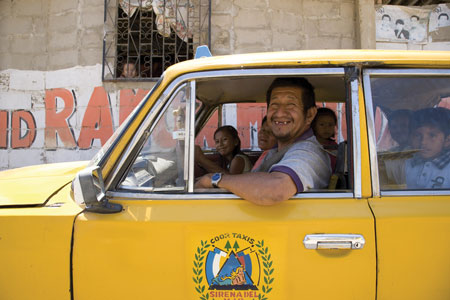A Colorful Thanks
Today is definitely a day to have fun! Combining the Irish festival of revelry, Saint Patrick's Day, with the Indian festival of color, Holi, on the same day is epic. So, I thought this would be a great day to show gratitude for those who enabled this project to blossom and thrive so far.
To start with, thanks to all the talented filmmakers who shot taxi videos in different parts of the world and submitted their work to us. The film festival would not have happened without your entries! Seyyed Ali Mousavi Azad from Kabul (Afghanistan) sent in two wonderful videos from his home country and from a short trip to Iran. Chaitra Yadaavar added a fiction flare to the line up with Kaala Peela (Black and Yellow), her film about one Mumbai cab driver’s unique story. Eric Hinojosa’s taxi video from Cairo was a collaboration with his friend and fellow passenger in the taxi and is set in post-Arab Spring Egypt. Arshak’s video from Pune captured many thoughts on gender in Indian society. Each one of these films will be highlighted in future posts for those who were not present during the screenings in India. Standing Together to Enable Peace (STEP) Trust brought these films to audiences in Kashmir, New Delhi, Chandigarh and Manipur as part of their 5th annual Jashn-e-Aman Festival. Thanks to the entire team, spearheaded by Shreya Jani, for making it possible.
In the spirit of Saint Patrick’s Day and raising toasts, I must raise a figurative glass to all the wonderful folks in Bozeman (Montana, USA) who donated their time and money to make the film festival come to life and for me to be able to travel to India. The list of supporters of my fundraiser is long and illustrious and I hope I don’t leave anyone out:
Jennifer Flinn
Serena Rundberg of Nova café, and her partner
Merrie Murdoch
Angie Williams
Kari Locati
Sarah Belk
Nancy Xander
Sonia Williamson
Brian Myers
Heather Wagner-Hansmeyer
Shane Johnson of Prime Inc.
Ron Gompertz of Wild Joe’s, and his lovely wife Michelle
Ann Marshall
Kirsten Smith
Betsy Fordyce
Ed Scheterlak
Joy Baker
Nancy and Richard Giddings
Pastor Dan
Tyler Walston and Beverly Bond Johnston
and everyone else who attended, donated, served, cooked and even swept the kitchen floor with us!
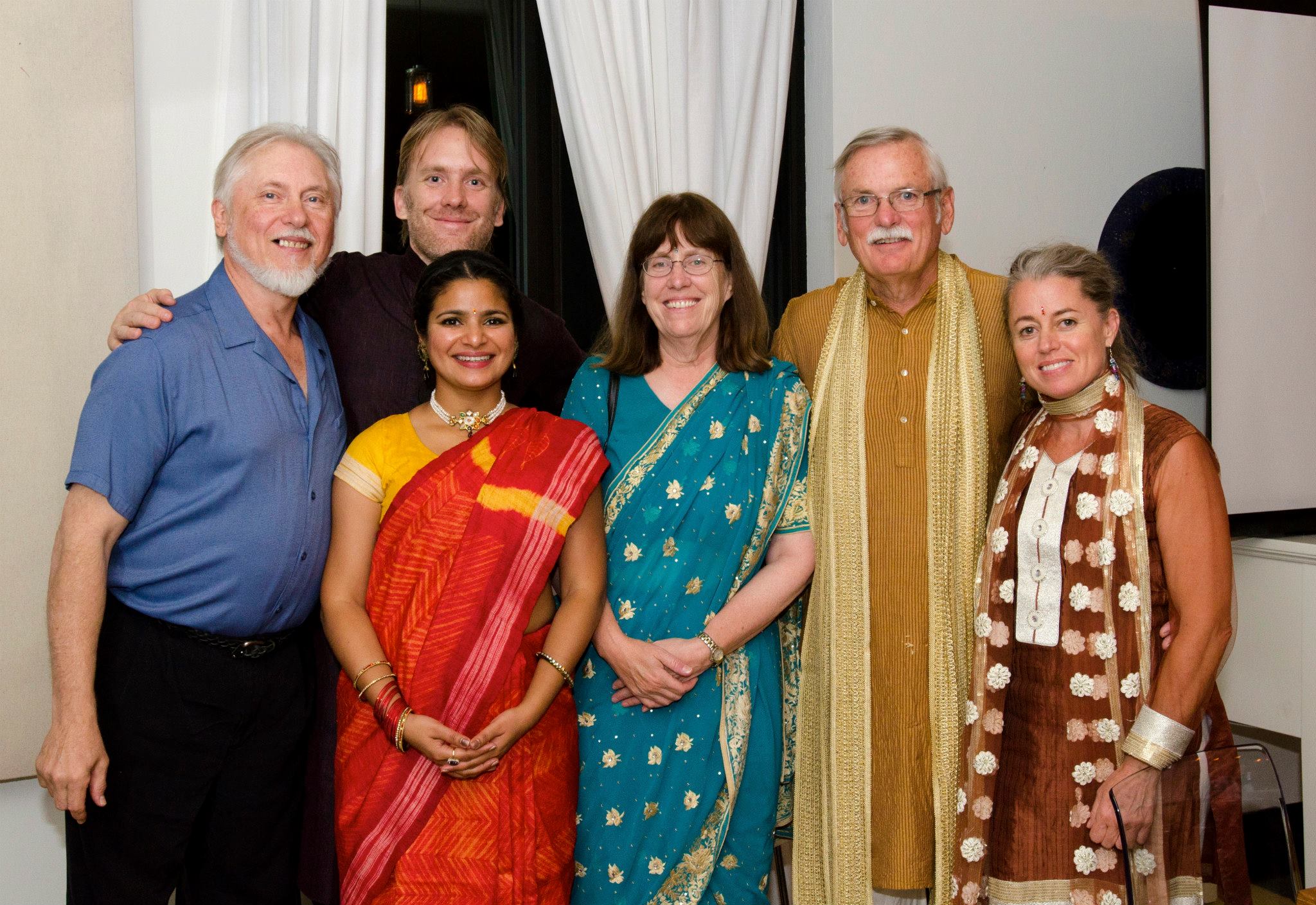
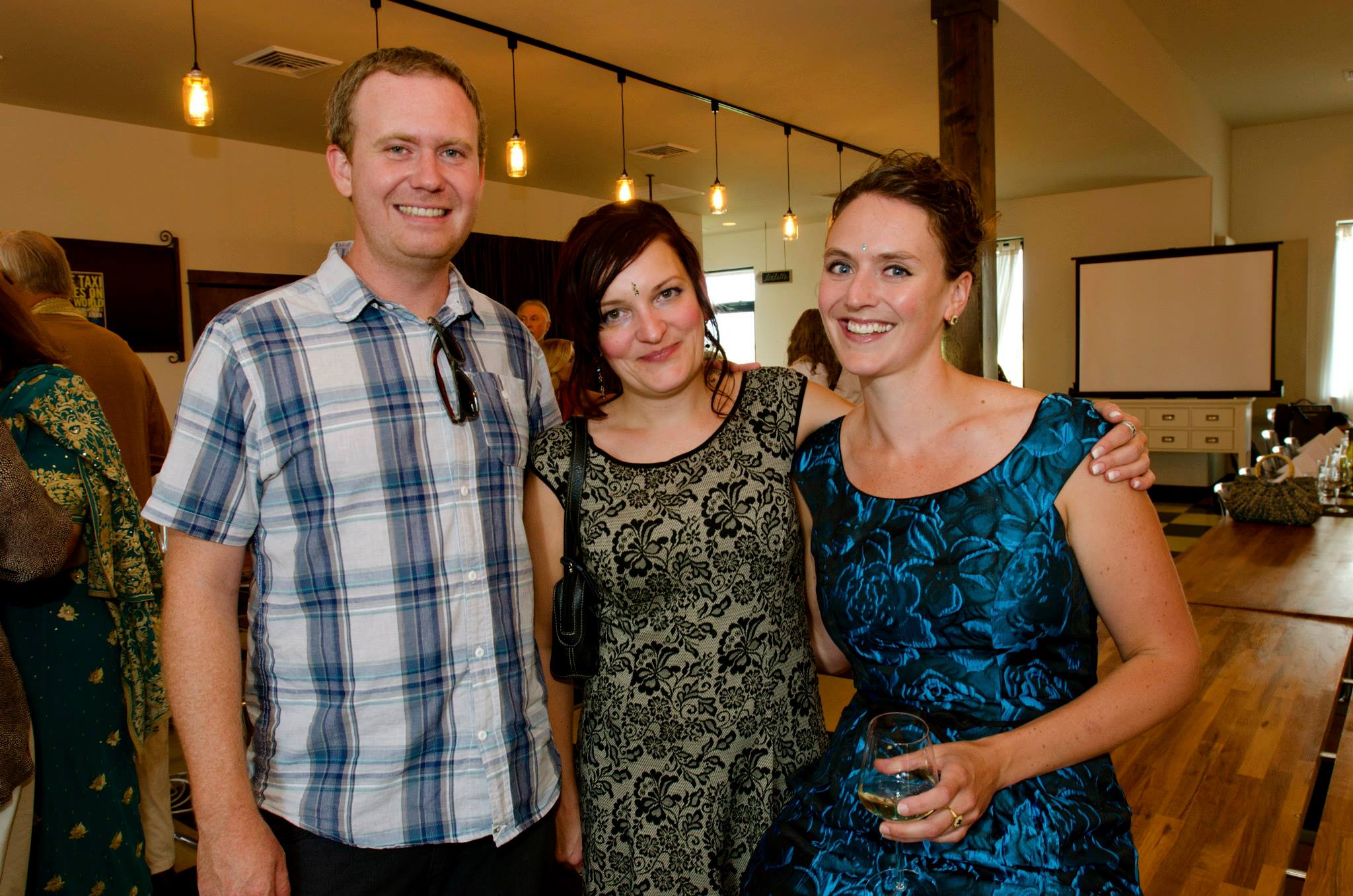
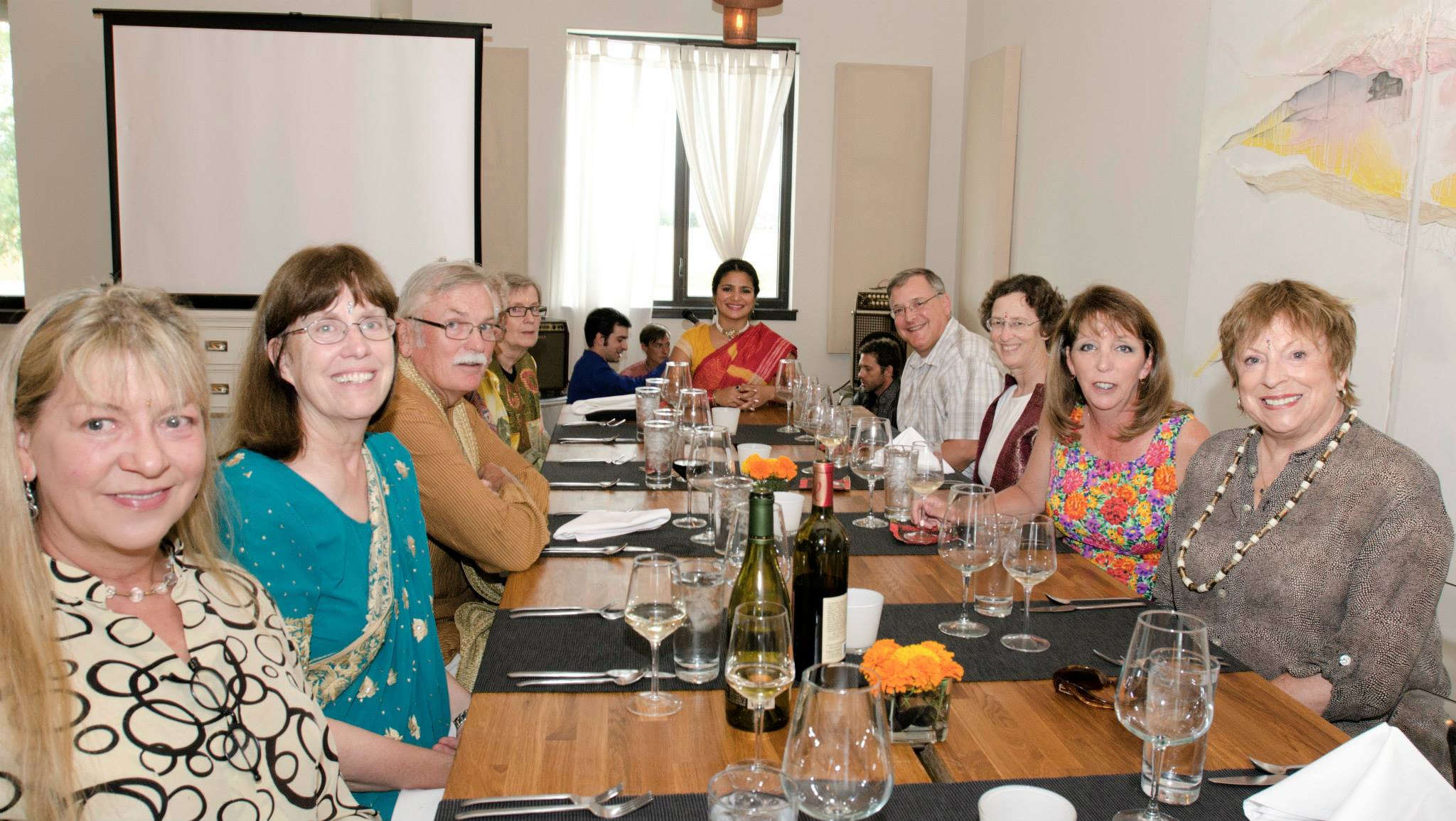
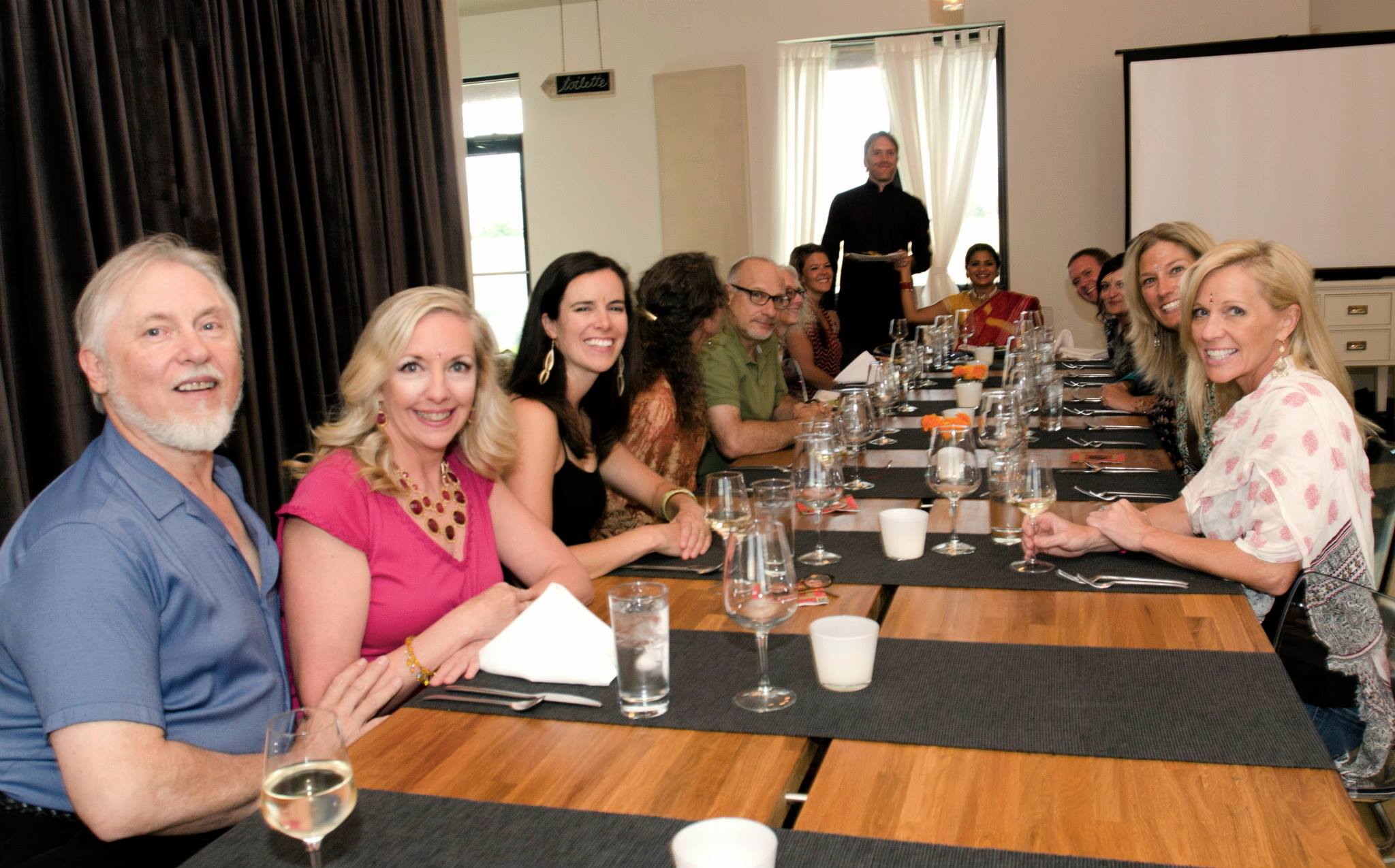
The Food Studio was our excellent venue and Daniel and Eva Wendell were the gracious and generous hosts.
Carol and Sal Leilani’s wine donation and support has been heartfelt and moving.
The Bozeman Magazine’s editor Angie Ripple publicized the event, which also got coverage on KBZK’s Morning Show.
Shelly Saunders captured the event with her camera and the images reflect all the encouragement and love I felt from the Bozeman community.
Last but not the least, the atmosphere at the event was kept musical thanks to Hanumantana. I personally feel honored to be partly responsible for introducing these fine musicians. Ken Glynn, Ankur Saxena, Jake Flemming and Russ Leonard are the heart of this Indo-Western fusion band that serenaded all of us at the fundraiser.
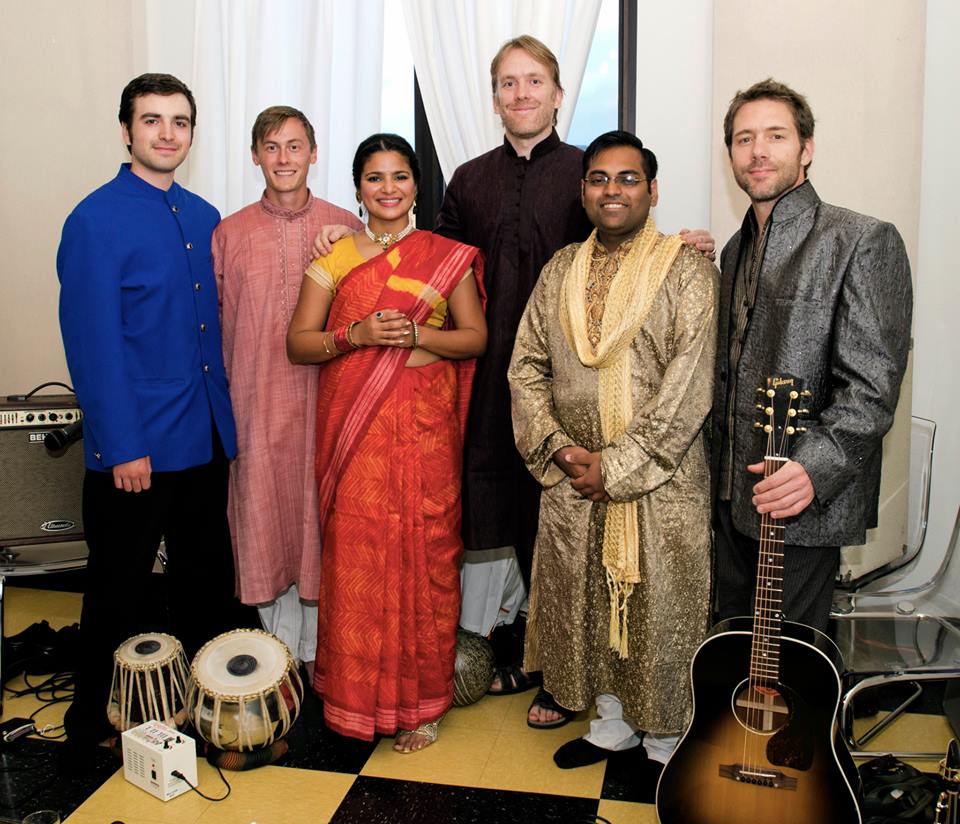
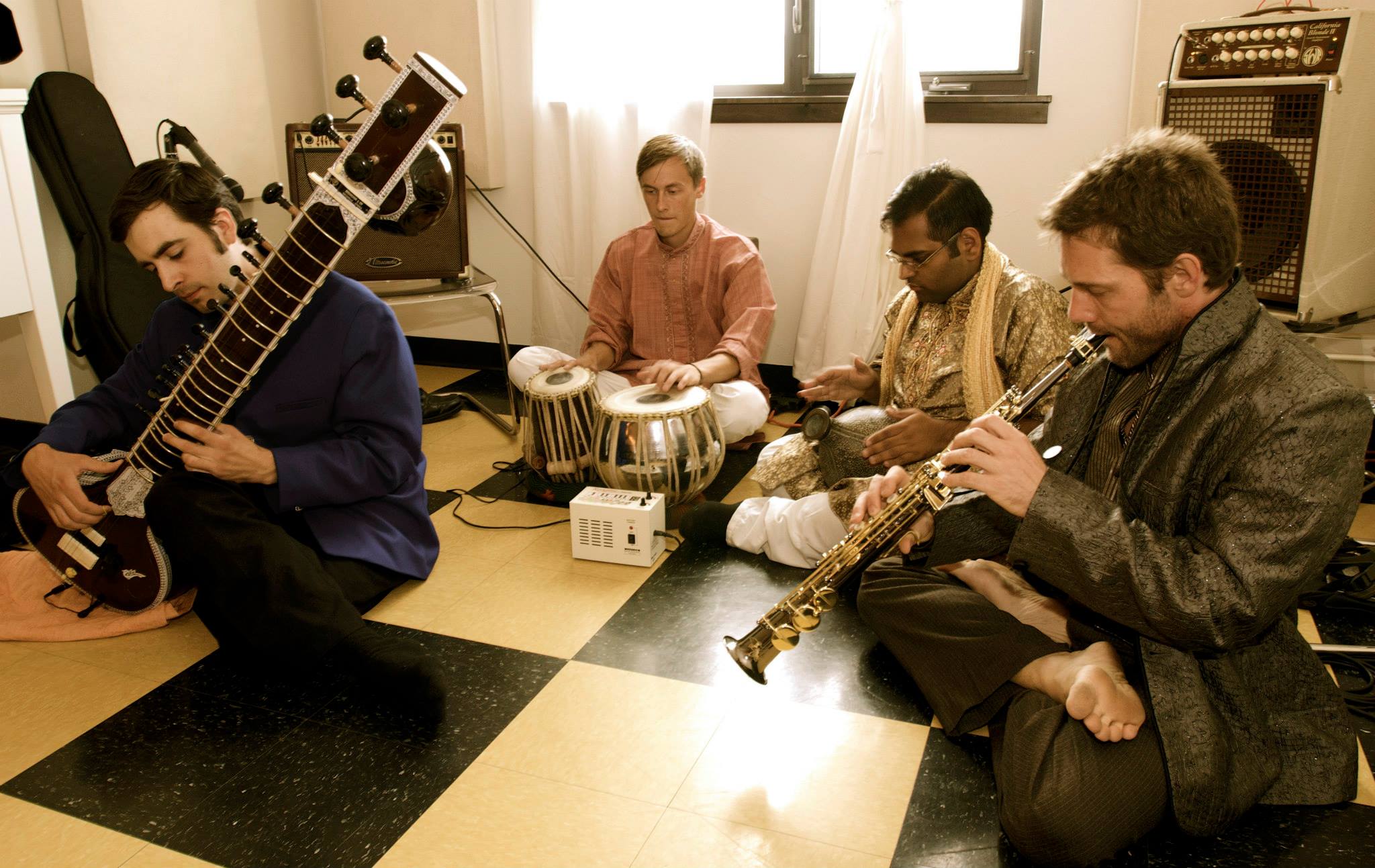
In celebrating Holi, the festival of color, we applaud that which has blossomed despite the cold, long winter. Heralding spring and renewal in our lives is a wonderful ritual. The Taxi Takes is springing ahead with the joy and encouragement that your support has given us.
Thank you and Namaste!
- Vandana
http://about.me/soodv
View PostFilm Festival Wrap up
In September 2013 this project reached a milestone. We successfully completed a film festival comprised of taxi videos from all around the globe. Submissions came in from Cairo (Egypt), Kabul (Afghanistan), Tehran (Iran) and Pune and Mumbai (India). Our partners STEP Trust arranged screenings in Kashmir, New Delhi, Chandigarh and Manipur starting on 21st September 2013 in Pulwama, Kashmir and ending on October 2nd 2013 in Churachandpur, Manipur. The films were well received and the audiences loved the overall concept. This is a picture of our audience in Chandigarh, which consisited of youth from Bhutan, India, Nepal, Afghanistan and several other neighboring countries. And another picture of the students in Churachandpur College watching the films.
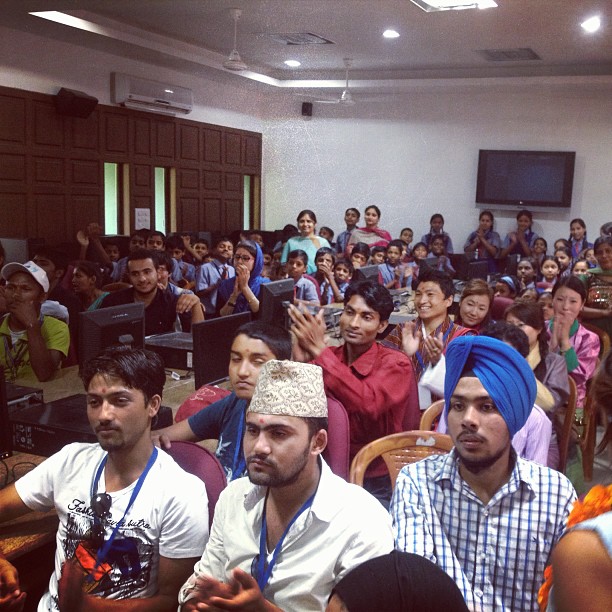
My own journey of making films based on taxi drivers started in New York City, with short films about South Asian drivers dealing with the repercussions of 9/11. This developed into a larger project called The Taxi Takes on Terror where I captured candid conversations between passengers and drivers in Mumbai after the 2008 terrorist attacks there. I rode in the front seat with various taxi drivers as they picked up passengers, and then filmed the talks and interactions between them. Since then, I've heard from many people who reacted to my project by relating that they too have had honest talks inside taxis all over the globe.
The democratization of media-making - with camera-enabled smartphones, mobile technology, self-publishing platforms, social media - and the rising wave of citizen journalism, all brewed together to inspire the next stage of this project - THE TAXI TAKES ON THE WORLD. This universal phenomenon of interactions inside taxis, coupled with the current digital lifestyles we live, led me to start crowdsourcing taxi videos starting in 2011. I invited people all around the world to send me their taxi videos capturing local perspectives about the big global issues of our time. These videos give us a glimpse of the grassroots dialogues and the day-to-day incidents that reflect alternative voices to those we usually consume via mainstream media. And screening these views in places of conflict like Kashmir and Manipur proved to be an incredible peace building initiative.
The taxi video that won the Audience Choice Award at the film festival in India was about a female taxi driver in Pune, India. The video by Arshak MA (a graduate of the Film and Television Institute of India) focuses on how one woman in Pune decided to start driving a taxi to assist in the safety of women and hopefully prevent future rapes. When this film was screened in New Delhi, the audience unanimously applauded her efforts. We will be gradually uploading the other videos we received as well and we know that the filmmakers will be eager to receive your feedback.
Thanks to everyone who supported me in making this film festival happen! Please continue to Take on the world!
- Vandana
)
View PostTaxi Takes Film Festival in India
The 2013 Jashn- e- Aman Festival began in Kashmir, India on September 21st the International day of Peace. I flew out from New Delhi that morning and reached Srinagar airport where I met Dhruv Sangari and his three member band. The band would be serenading all of us at the opening night that evening. I got to know the band well over a lunch which featured some of the most delectable meat dishes I had ever had. My favorite dish was the spinach sautéed in mustard oil. Simple, yet unforgettable. Having a delicious meal makes an unfamiliar place always a little comforting for me.
If the state of Kerala in South India is popularly termed God’s own country, Kashmir is popularly called ‘Heaven on Earth.’ The term apparently originates from a Mughal emperor centuries ago, who said ‘If there is heaven on Earth it is here, it is here, it is here.’ But this heaven has obviously been afflicted by the evil eye (nazar in urdu and Turkish) a superstitious belief common to many middle Eastern and Persian cultures. Kashmir is one of the biggest conflict areas in South Asia and one of the most highly militarized zones. The history and skirmish between India and Pakistan for this slice of heaven is long, layered and complicated. And the effects of this struggle could be witnessed as we drove past broken down buildings, roads that had not been fixed and armed personnel at every street corner.
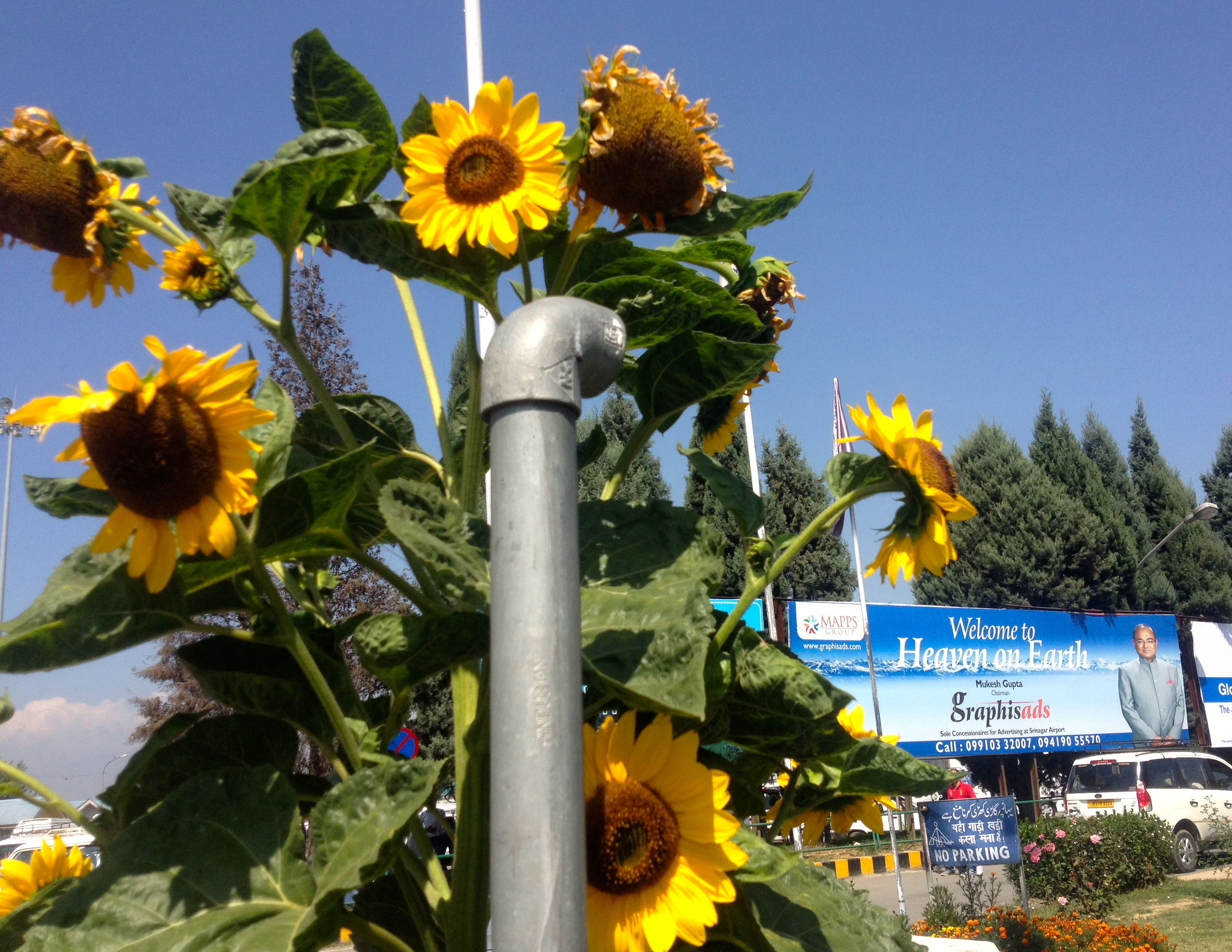
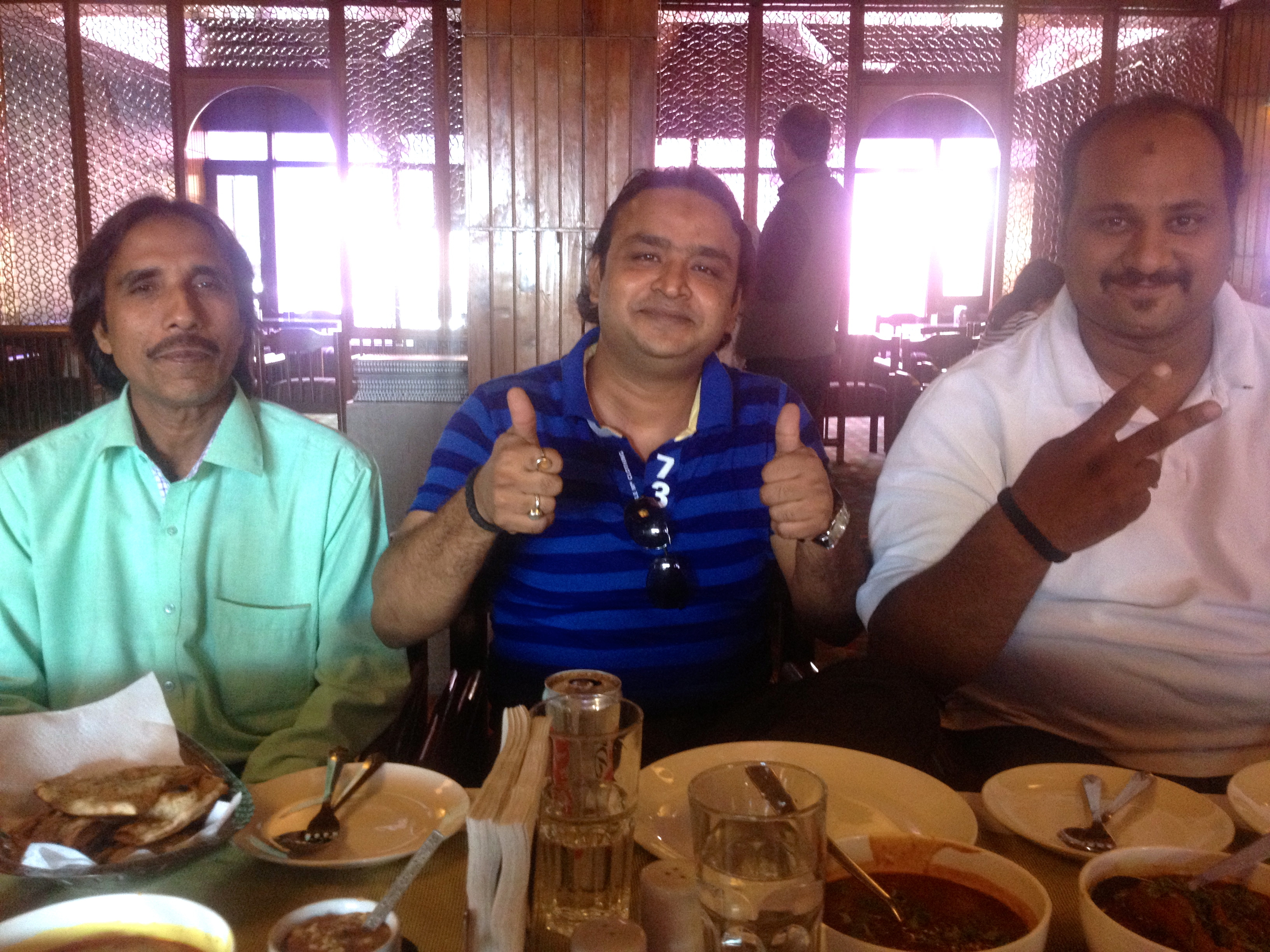
The sights of guns soon vanished from my mind as we parked our car at Nigeen Lake. This lake is a part of the famous Dal lake featured in umpteen Bollywood films and is less touristy and absolutely breathtaking. We stepped as daintily as we could on to the shikaras, Kashmiri ships which look fragile but are sturdy and glide effortlessly through the water lilies and foliage growing in the lakes. We reached Samad's Island of Peace Hotel. A unique privately owned historical building where Dhruv Sangari, Siraj Khan, Salaamat and Pavan played serene sufi music under the stars that night to open the 2013 Jashn-e-Aman Festival.
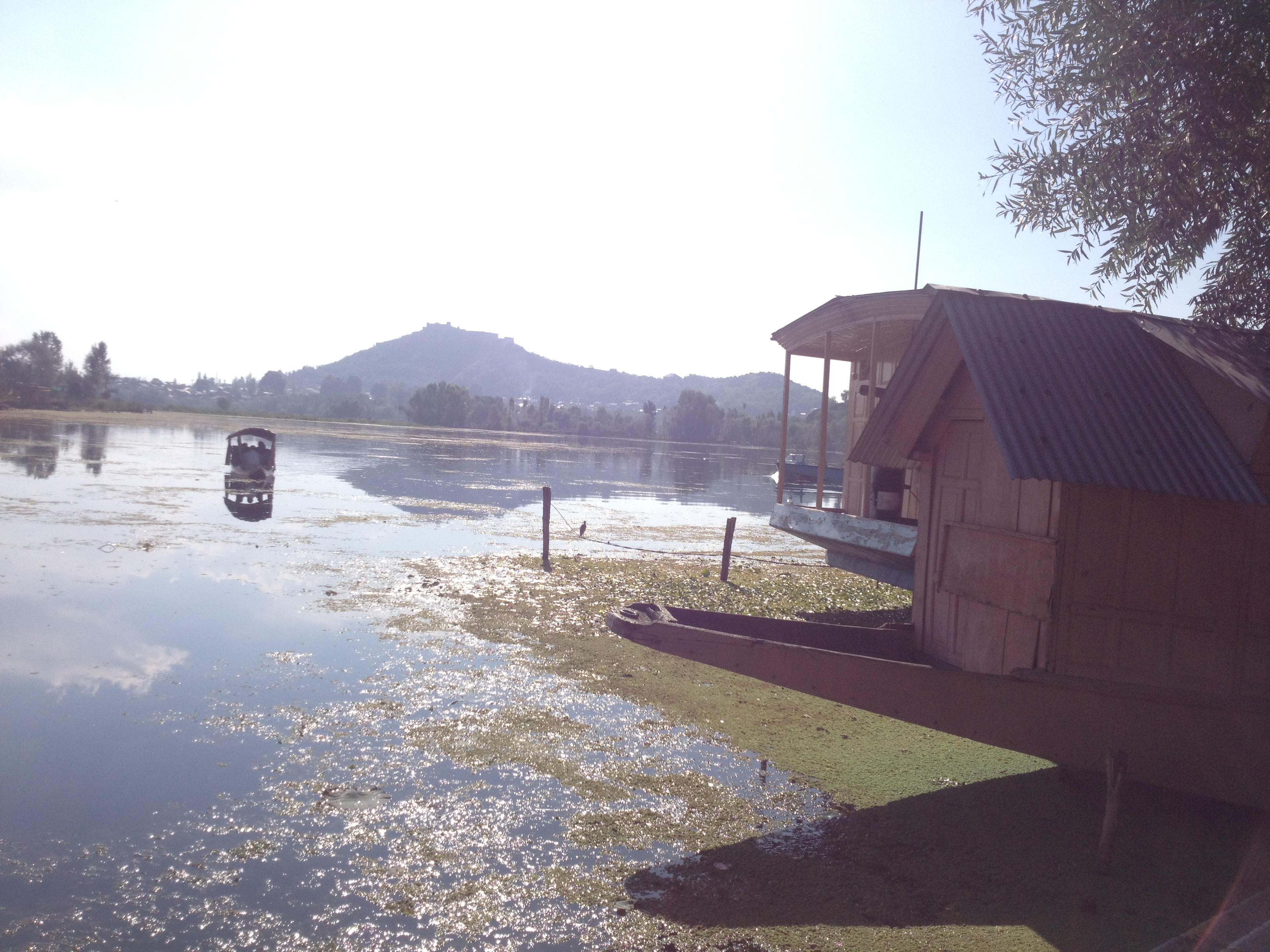
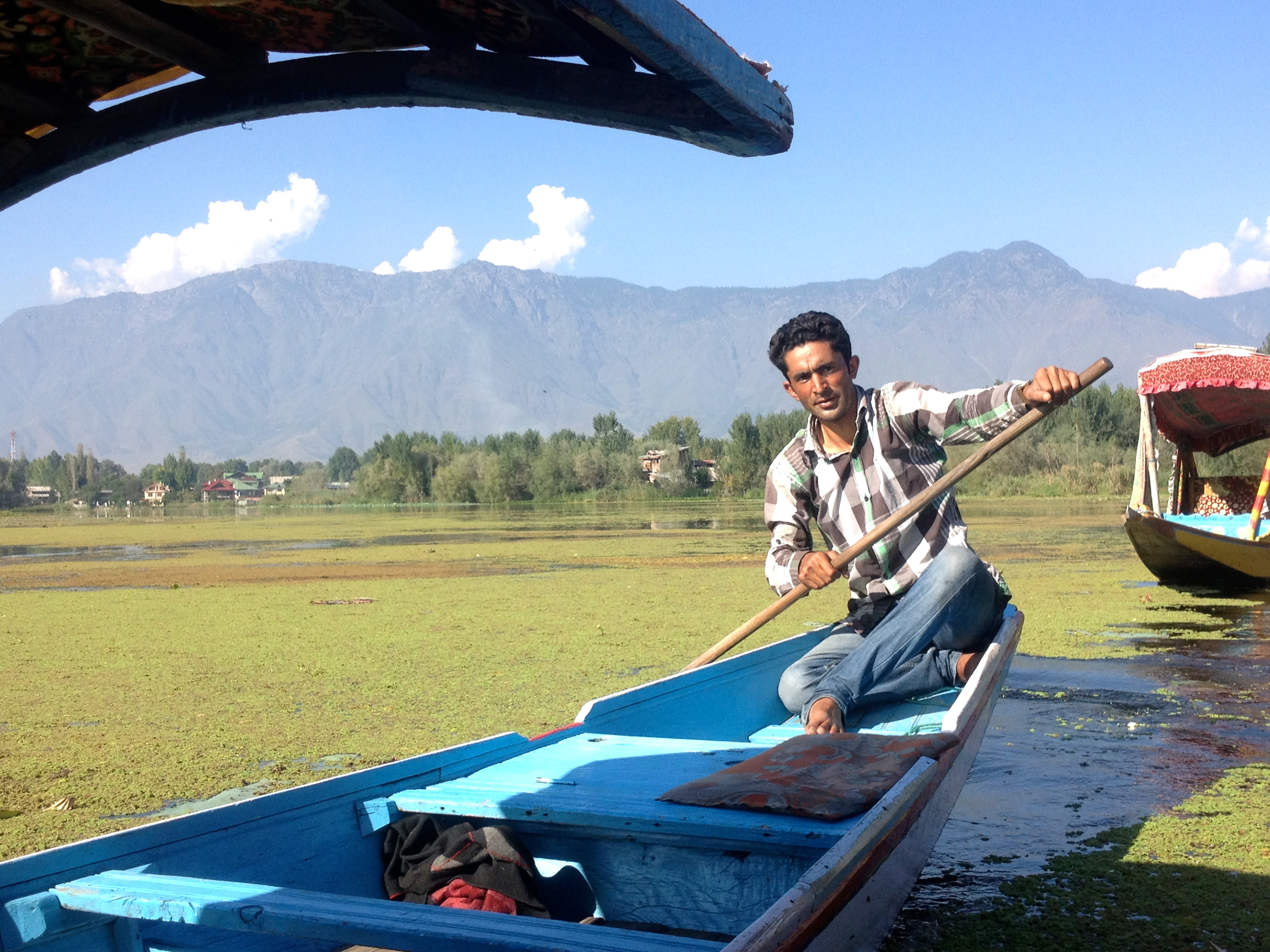
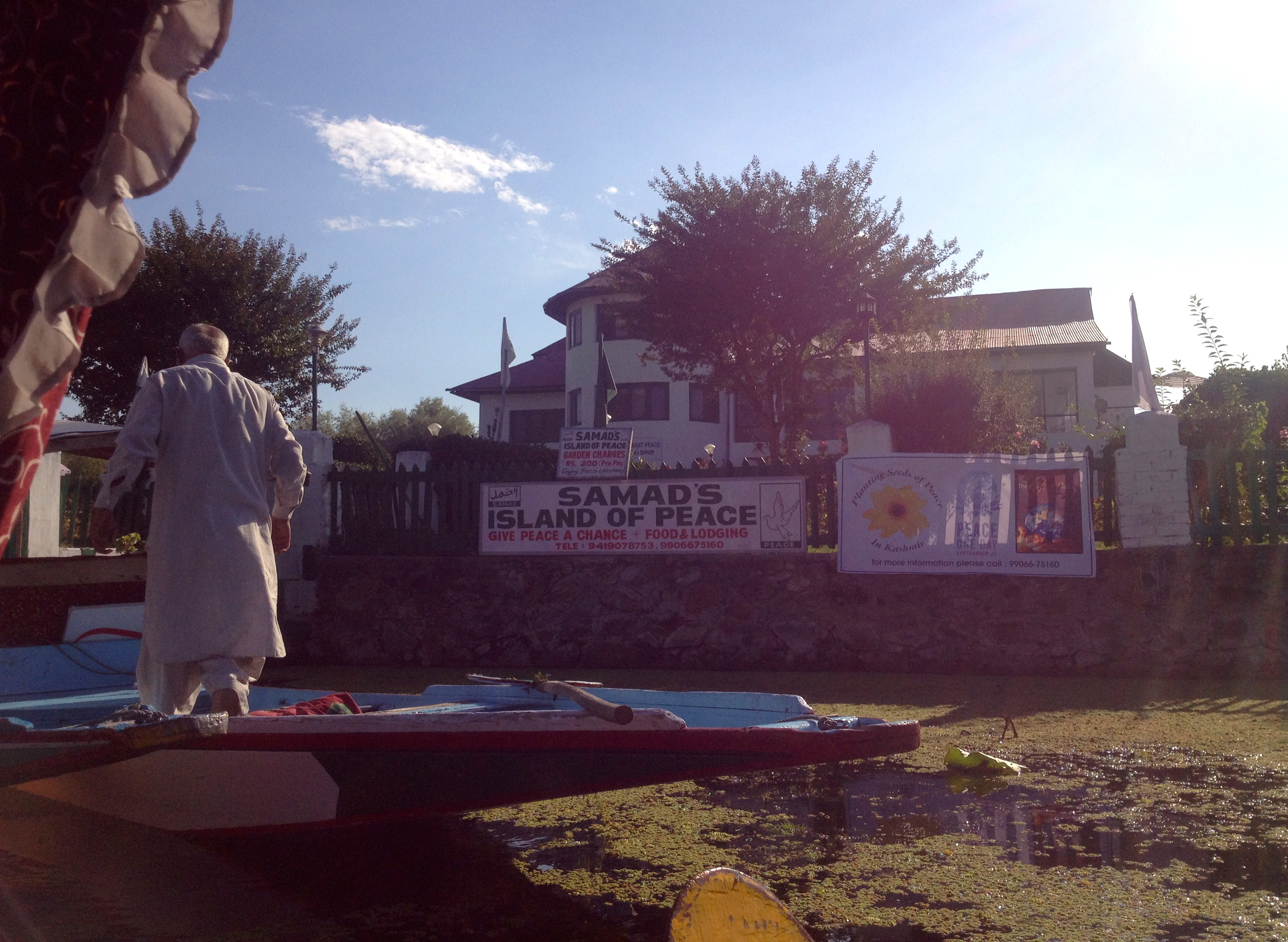

So the festival started on a high melodious note. To give you perspective just a week ago the famous conductor Zubin Mehta held a concert in Srinagar’s Mughal era Shalimar gardens to an audience packed with the Nation’s glitterati. The concert was rocked with protests by the separationists and led to a statewide shutdown. In light of these happenings and shootings in the district of Shopian my family had been hesitant about letting me go to Kashmir. But I managed to convince them of my safety and everything was off to a good start and I joined the entourage of STEP’s facilitators and we took off for Pulwama, a district to the North, where the screenings were to be held.
The screenings of The Taxi Takes on the World were held on the 23rd of September at the Kashmir Creative Educational Foundation. In spite of the problems in the region many students braved it to come attend. Yes, many of the things that can be taken for granted by many of us were things that Kashmiris were used to either waiting for or fighting for. I screened my own taxi takes from New York and Mumbai first and then introduced the entries for the film festival. One observation I had was that during the screening of the short film ‘Women and Islam’ there is a section where a conservative Muslim man tries to justify the Taliban’s acts. He says that a married woman has no right to adultery and that is why she is whipped as punishment. Strangely enough the audience both girls and boys clapped in affirmation. This reaction surprised me. Never before had I had an audience which was 99% Muslim and also never before had I found agreement to the old Muslim man’s perspective from the audience. Or, never agreement expressed openly. Deep down inside it’s not as simple as I make it sound. And to be honest I was an outsider in Kashmir and knew that I did not know enough about the moral compass of the place, or only knew things based on what mainstream media wished to portray. And it reminded me about the core of what this project is all about after all. Cultural understanding doesn’t happen if I only find people who agree with me. I had always encountered resistance to what the Muslim man said while I need to acknowledge that he is not a lone wolf who feels that way. There are many out there with differing views from ours and its only by embracing these other viewpoints that we can try and reach tolerance maybe.
Overall there were 6 films screened from New York City, Afghanistan, Iran, Egypt, Pune and Mumbai, India. We did a show of hands for which country they would like to see and they were all excited to view and metaphorically visit the short from Kabul, Afghanistan by Seyyed Ali Mousavi Azad. They connected with it the most and felt Afghanistan and its people were just like them in Kashmir. When the chance came for a Q and A everyone was rather quiet. But soon after when I was alone many students came up to me and wanted to talk to me about their experiences of watching the Taxi Takes.
The next day it was time to leave already. I was very lucky to have spent time with Kashmiri youth and be welcomed into their world. I got to know several of the girls very well and we even took some taxi rides together to the local market. At one point while waiting for a taxi I was standing with women wearing different forms of Kashmiri dresses which was fun. I left Kashmir a more informed person for sure. And with a deeper respect for the courage and beauty of it's people.
Fundraiser in Bozeman
This September I am excited to announce the first film festival based on this project. The Taxi Takes on the World @ Celebrtaion of Peace (Jashn-e-Aman) Film Festival will be held in 4 states in India, from September 21st - October 2nd, 2013. The film festival is part of a larger event that is organized by the Non Profit STEP - Standing Together to Enable Peace Trust, based in New Delhi. They will be handling all the logistics of the film festival while I will be curating all the taxi take videos to screen in Kashmir, Punjab, New Delhi and Manipur. I already have a line up of videos that have been submitted from Cairo, New York City, Afghanistan, Mumbai, Montreal and Beijing.
I know that there are a few more videos that will meet the deadline and so Indian audiences will get to hear and see a diversity of voices and people in these taxi takes! As many of you may or may not know I have lived in Bozeman Montana for the past 3 years. While Bozeman may not be the taxi capital of the world, I've been extremely lucky to find the community here so interested in The Taxi Takes on the World, and so my plan is to, after the festival in India, bring back the taxi videos to Montana. For this I need your help!
I am in the process of organizing a unique event in town. In my time here, I've had repeated requests from several folks, strangers and friends, to open up an Indian restaurant in town. While I can't do that, what I can do is have a big dinner event featuring cuisine from India. This sit down dinner will be hosted at The Food Studio with their long family style tables and a vibe and décor that scream contemporary elegance. The plan is to have a 3 course dinner starting with a paneer (Indian cottage cheese) appetizer and a glass of wine as you walk in. During this spicy cocktail time people will be serenaded by a wonderful local band I helped start called Hanumantana. Hanuman, the mythical monkey God from India comes to Montana in this Indo-Western fusion band that comprises Russ Leonard (Sitar), Jake Flemming (guitar), Ken Glynn (tabla) and Ankur Saxena (vocals). The band was conceived with the same concept as my film project of bridging cultures. By now attendees would be ready for a bigger appetizer and the music will continue and small plates would be served. I plan to screen some of the videos I have already received for everyone next. So, as you start digging into the main course that will be ‘chicken tikka masala’ and ‘sukhe aloo’ with aromatic basmati rice and a drizzle of coriander and green chili yogurt, I will fill you in on this crowd sourced interactive documentary of mine. The night promises to be a warm heady mix of spicy Indian flavors, exotic tunes and sounds, and films that will let you step into taxis from around the globe and listen in on intimate eye opening conversations.
We live in troubled times and with my work I am trying to recapture spaces where strangers meet, connect and overcome stereotypes and boundaries. In spite of all the social media communication in the world I find that we are actually more wary of our neighbors and new cultures. In my project The Taxi Takes on the World I aim to create a portal where heartfelt moments are captured which educated and enrich our lives about human connectedness.
To support me in this fundraising initiative, please consider being a part of this evening. Your support will help me to cover my costs for going to India and then helping me to bring back the films here so that I can hold The Taxi Takes on Montana Film Festival!
Details of the evening:
Date - 6th September
Time - 6:30 - 9 pm
Venue- The Food Studio, 2251 West Kagy Suite 1, Bozeman 59715
Ticket price - $75 per person
To reserve your spot for the evening please sign up with your details below.
View Post
Taxis in Quito
by Rick Segreda.
My first reaction to Vandana's proposal, via email, about an alliance between documentary filmmakers and cab drivers was befuddlement -- wha...taxis? journalists? But the more I studied it, the more intriguing it became. As it is, I am a bilingual, bi-national (Ecuadorian, American) journalist based out of Quito, and depend on taxis a lot, especially in the last year when, due to a case of tendinitis in my left heel, I am on doctor's orders not to walk too much.
But it has been my nature for years to converse with Quito's local "taxistas" anyhow, as well as argue with them when they claim their meters don't work and they want to charge me triple. A great many drivers are old men who used previously drove trucks or buses, and continue to drive because their pensions are inadequate and/or their grandchildren need financial support. Their are also more than a few drivers you'll meet who have trade skills and certifications, and occasionally even a university degree, but have been downsized and driving a cab guarantees some, as opposed to no, income.
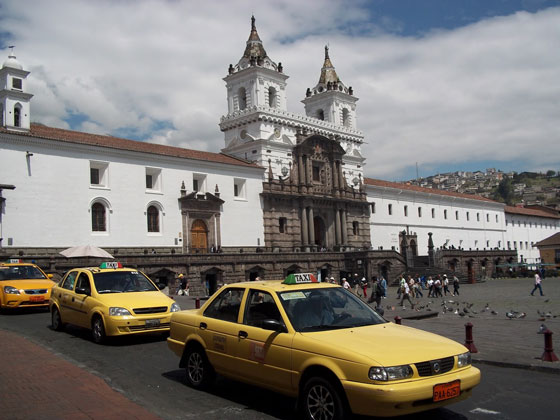
Some speak English due to having previously lived, illegally, in the United States, earning enough money in a few years, sometimes as a taxi driver, to make a down payment on a house in Ecuador or pay for their children's college education. I once got into a cab being driven an Army officer in full uniform -- and in flagrant violation of the military's strict prohibition against servicemen and women "moonlighting" (or since this was at midday, "sunlighting").
The tallest tale told to me with a straight face was by a young man who said he picked up a young woman late at night who asked that he take her to the city cemetery, Upon arrival, and after giving the driver her phone number, she ran out of the car in tears without paying her fare, and climbed the locked gate, leaving behind a sweater. The next morning, the driver, so he said, called the number and an older woman responded, saying that the youn woman he was asking about was her late daughter, who had died the previous year in an auto accident.
It was an entertaining, but thoroughly apocryphal anecdote, a variation of the classic Latin American legend of the "llorona" (the "crying woman"), whose roots probably precede the Spanish colonial conquest.
Drivers in Quito are about 99% male, and almost are surviving victims of assault, something which is no longer confined to nocturnal hours and poor neighborhoods. However, there has also been a new phenomenon of vehicular muggers, groups of thugs who purchase older cabs or paint cars yellow to resemble taxis -- and even install running meters -- in order to assault, mug, kidnap and even rape unsuspecting passengers. Cabs have also become a political issue, particularly after a fiat several years in which President Rafael Correa claimed everybody had a "right" to work and ordered municipalities not to prosecute unlicensed drivers and vehicles, even though licensed drivers are required to pay municipal taxes. This policy was rescinded once news reports surfaced of the emergence of "criminal" cabs. However, this bespeaks of the challenges faced by a country in which, despite a notable growth in hte real estate sector, in which too many of its citizens are unemployed or underemployed --even while being overworked; a great many drivers work 12 to 14 hour days. Yet the compensation is relatively inadequate, since fares have remained low -- about a dollar per two kilimeters -- even as the cost of living has risen. And despite the existence of a union for drivers, a fear of losing potential customers keeps its members from collectively agreeing to raise prices.
And thus, the taxi remains not just a means of transport for Quito's passengers as they move about the city taking care of whatever personal business needs to be taken care of, but also conveyance for the demands and drama of human existence.
Rick Segreda is the film critic for Ecuador's 'La Hora' and a professor of film at the Instituto de Artes Visuales de Quito, as well as a filmmaker and author.
Status of women in India
This matter, this story, this recent rape has created great unrest in India. And rightly so. Protests, candle light rallies can be seen sprouting throughout India. And the masses are ablaze, angered and active. And I am perplexed. Because to be honest, Indian women, especially in New Delhi have been eve teased, groped and raped for awhile now. It's in the papers often and everyday harrasment on the streets is common. The statistics are very high and shocking. Most women do not report abuse for fear of being publicly denounced and humiliated in society. And that’s where the problem lies! In society. Amongst us. In our minds. We all have been privy to some form or shape of abuse in Indian society. We watch as a man bleeds from an accident on a road, slow down, shake our heads………and then drive away. Even when terrorism hits our towns and cities we say that ‘life must move on.’ Because if most Indians were not immune to suffering like beggars and poverty, accident and crime….how could we go about our daily business of earning a living, working for our families. Yes. Believe me, this is the rhetoric you hear growing up in India. And in the same vein when a woman is abused it gets swept under the rug along with the dust bunnies of many others. But this incident will go down in history I hope. And I hope that the reason will be that the types of attitudes in society that allow such thoughts to become deeds and actions change. When families can be proud when they have a baby girl born in their home. When policemen and politicians don't think that the woman desreved rape because she wore a skirt or jeans. When an entire family, community, neigborhood will stand behind a woman who has been sexually assaulted rather than whisper behind her back and make her an outcast. That day will take time to come unfortunately. Yes the tides have shifted I agree. But it will take more than articles and press, videos and twitter campaigns to change the basic underlying bedrock of Indian society and where women have been placed in that hierarchy. Until then my prayers go out not just to this girl’s family but to all those women in India and around the world who have faced rape, abuse and sexual harassment. Because keep in mind. This is not a one off occurrence only in New Delhi but happends every day in some city or town all around the world.
For now I have said enough. I don't feel like analyzing all the statistics and going over the reasons. I stand and weep for that nameless girl whose only crime was to be born a woman returning from a movie she saw with a friend. She died on the 28th of December 2012. A day of rebirth some could say. To end on a slightly uplifting note, watch this. A short interview I took after the 2008 terrorist attack in Mumbai, India as part of my earlier project The Taxi Takes on Terror. The simple and courageous voice of another young woman in India who’s trying to overcome gender determined limitations in her own way, as she drives a taxi.
View PostMaking music inside a Bucharest taxi
Your song, Day for my eyes is shot inside a taxi. The driver says that when you first met, you sang in his taxi. what made you feel like singing in the taxi? Do you often sing in public taxis when you travel?
It was one of those winter days, when the world turns silent in the streets. There’s not much to do outside, so we were going to the rehearsing room to kill some time. Roxana is always making me take out my guitar in the most dubious locations, even in front of my parents, her ex – colleagues and such. And this taxi ride was one of those moments. She felt like singing right away and we just did it. And the taxi guy had only one hand, if you noticed in the video, he’s one of a kind. His nickname is Manuta, which means something like ‘little hand’. One of the most fun people we ever encountered and one of the most positive people around, with such joy for living and meeting new people. All in all, it’s a great feeling to just know that you have some sort of device, like a guitar and vocals, always with you, and you can actually use them whenever you feel like.
Are you still friends with the driver? He seemed very supportive of your band. Can you tell us how your experience was of talking to the driver, playing a guitar, singing and filming inside the taxi?
We’re not quite friends, actually we haven’t spoke to him since. It’s all happenstance that one day we’ll swing into the right car, out of the thousands yellow taxis in Bucharest.
We are excited to place your song in the upcoming trailer video for The Taxi Takes on the World and are happy you have been open to sharing your music. what are your plans for the coming year?
Ohh, we’re just about to release our 3rd video and hope to make an album at some point, but we’re still focusing on writing more good songs, so that we’ll have a real audience that would probably be interested in our album. We’d just love to make videos and songs for our whole lives, and our feeling is that we’re getting more used to it, and eventually we’ll get better at doing it. It’s weird for a band at this point in time, but we’re looking to get more confidence in our capacities as artists, and the audience will definitely perceive it as it comes: naïve and truthfully coloured.
We Singing Colors can be liked on their Facebook Page and you can hear more of their music and see videos on the We Singing Colors YouTube Page.
View PostThe Taxi Takes on Kashmir
Guest Post by Megha Rawat of STEP – Standing Together to Enable Peace
After weeks of preparation for Jashn E Aman (Celebration of Peace) 2012 I got excited about welcoming 25 students from Delhi and 25 students from Kashmir to the 4 day residential camp in Srinagar, Kashmir. Determined to ‘Find Common Ground’, the theme for this year’s annual Peace festival, the team arrived in awe of the beauty of Kashmir but exhausted from the long journey they had undertaken from New Delhi. We had planned workshops in theatre, photography, media and peace education for both teachers and students who were participating from around India. STEPS’s partnership with The Taxi Takes on the World was the focus of the media workshop. We would be training the youth in documentary film, social media, citizen journalism and other skills which would then lead to their filming inside taxis in Kashmir. We had a long road ahead! The students from Kashmir were supposed to join us on September 21st, The International Day of Peace but unfortunately the unrest caused by the viral video, ‘Innocence of Muslims’ around the world dampened the atmosphere in Kashmir also. Most of the people we were expecting couldn’t make it to the program due to the curfew that was announced. Internet connections and mobile phone networks were jammed and things only barely began to settle down in the city towards the evening. Inspite of the chaos and curfew the spirit of the participants triumphed and we went ahead with our plans. With participants eager to explore Kashmir, we had to exercise caution traveling around due to the curfew on the streets and the possibility of violence. We are extremely thankful to the people who joined us on that day despite all odds. After a choppy start the festival did finally get underwa.y
The culmination of each of the workshops was a presentation that was to be made by each of the groups on the work they had done through the camp. Nothing could have prepared us for what we heard from each of the participants in this time. The initial feeling of doubt and suspicion regarding our motives for being in Kashmir was replaced by faith and empathy, with which came ease in sharing personal stories filled with both anger and sorrow. As part of The Taxi Takes on Srinagar, the youth spent the day out on the streets without any supervision and documented stories and conversations with people. The camaraderie in the group grew with this experience. The feedback I got was that everyone instantly connected with the concept and seamlessly started chatting and filming inside the taxis. The Kashmiri students would take on the role of translators when the need arose. Some students would naturally take over as the journalists asking questions, while some others did both the filming and interviewing. Also, the taxis in Kashmir are larger, almost like shuttles, seating roughly 6-8 people including the driver. So many a times the other passengers got intrigued with the filming and conversations and opened up and gave their own takes on the issues being discussed. The conversations that the youth managed to have and film as part of ‘The Taxi Takes on Srinagar’ has given all of them a fresh perspective on the issues affecting the common man in Kashmir. In some cases it confirmed their hunch and at other times the talks inside the taxis revealed another perspective to the issues that they had not considered.
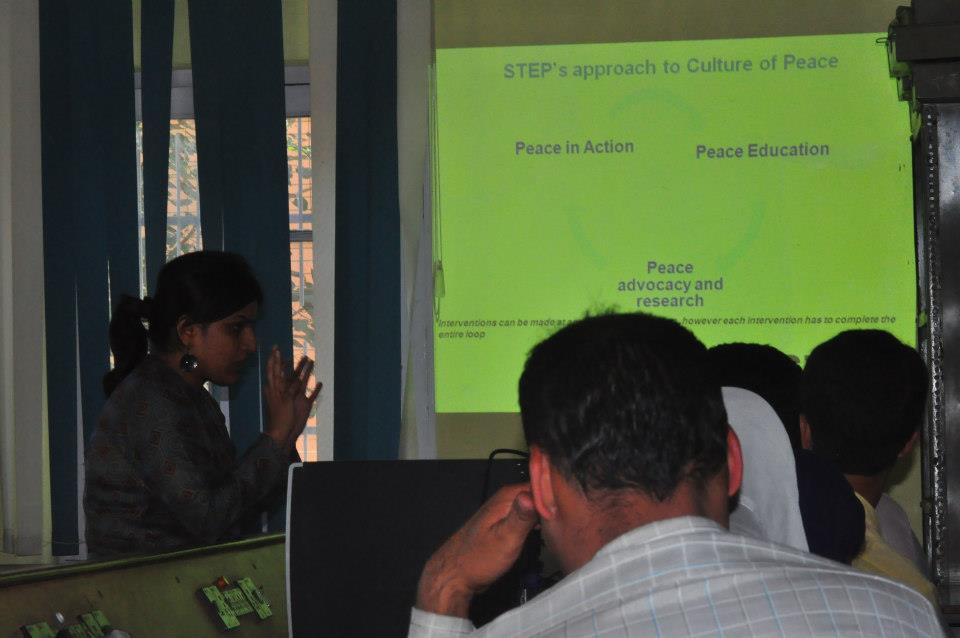
The festival gave the students and teachers insights into Kashmir which they would otherwise never get from Mainstream media. Kashmiri students welcomed the others into their houses and gave each of them a real taste of Kashmiri hospitality which was deeply appreciated. And when the festival finally commenced the Kashmiri students refused to go home but stayed with our team and escorted us to the bus station at 2 am. I’ll never forget the image of them waving goodbye as our bus rolled down the road towards the foothills. And so it was that the team departed from Srinagar on the 26th of September, 2012 with heavy hearts but with many accomplishments under our belt and the promise to meet again the next year in 2013. We continued our festival Jashn E Aman in New Delhi until just recently with regular showcases of the work done by the participants in Srinagar. ‘The Taxi Takes on Sringar’ have been screened in various venues in Delhi just as the work of the photography group has been converted into a traveling photo exhibition. The work of other groups and reports will soon be available on STEP’s online magazine, The Jester. We are happy to say that we conquered the road less traveled of peace building in Kashmir.
View Post

